|
|
|
Sort Order |
|
|
|
Items / Page
|
|
|
|
|
|
|
| Srl | Item |
| 1 |
ID:
116629
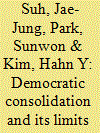

|
|
|
|
|
| Publication |
2012.
|
| Summary/Abstract |
This article uses dilemmas of cooptation to explain progress and limits in South Korea's democratic consolidation since its transition to democracy in 1987. The series of cooptations employed by both conservative and liberal forces has helped to consolidate democracy but also to limit the extent of democratic reforms.
|
|
|
|
|
|
|
|
|
|
|
|
|
|
|
|
| 2 |
ID:
132348
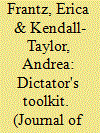

|
|
|
|
|
| Publication |
2014.
|
| Summary/Abstract |
A dictator's motivation for using repression is fairly clear, but why some repress more than others or favor particular types of repressive strategies is less obvious. Using statistical analysis, this article demonstrates that a dictator's reliance on co-optation fundamentally alters how repression is used. Specifically, it finds that co-optation through the use of political parties and a legislature creates incentives that lead dictators to decrease empowerment rights restrictions, like censorship, while increasing physical integrity rights violations, like torture and political imprisonment. This occurs because, by creating parties and a legislature, a dictator draws his potential opposition out of the general public and into state institutions, making it easier to identify who these opponents are, to monitor their activities, and to gauge the extent of their popular support. This reduces the need to impose broad types of repressive measures, like empowerment rights restrictions, that breed discontent within the overall population. At the same time, co-optation creates the risk that rivals, once co-opted, will use their positions within the system to build their own bases of support from which to seek the dictator's overthrow, generating incentives for dictators to increase physical integrity violations to limit the threat posed by these individuals.
|
|
|
|
|
|
|
|
|
|
|
|
|
|
|
|
| 3 |
ID:
184753
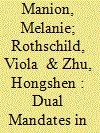

|
|
|
|
|
| Summary/Abstract |
democracies, the literature has failed to notice their existence in China, let alone theorize or analyze them. We turn to the political science literature on assemblies under authoritarianism to guide our analysis of survey data for 3,008 county congress delegates, half of whom are concurrent ones. We show that dual mandates amplify some voices and not others in ways consistent with two perspectives in the literature. Dual mandates amplify information from citizens at the grassroots upward toward governments: More delegates with deep community roots representing poor, rural, remote districts sit concurrently in county and lower-level congresses. Dual mandates also coopt influential groups posing a potential challenge to ruling party power: They amplify the influence of private entrepreneurs, more of whom sit concurrently in county and prestigious higher-level congresses.
|
|
|
|
|
|
|
|
|
|
|
|
|
|
|
|
| 4 |
ID:
189046
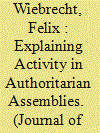

|
|
|
|
|
| Summary/Abstract |
Who attempts to influence policymaking through authoritarian assemblies and why are some delegates considerably more active in doing so than others? Drawing on original data from provincial People's Political Consultative Conferences (PPCCs) in China, this study adopts a delegate-centered perspective and develops a theory of delegates’ activity in authoritarian assemblies. It argues that delegates’ activity can be explained by a combination of both cooptation theory and an understanding of delegates’ position within the authoritarian regime and hierarchy. The results highlight that core elites with more direct means of influencing policymaking will forego assemblies. Yet, peripheral elites lack other institutional channels of access to decision-makers and have to voice their demands in authoritarian legislatures. This study highlights the need for disaggregating groups of actors in authoritarian politics and offers an alternative view of cooptation particularly relevant for closed authoritarian regimes.
|
|
|
|
|
|
|
|
|
|
|
|
|
|
|
|
| 5 |
ID:
142168
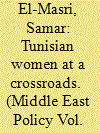

|
|
|
|
|
| Summary/Abstract |
The role of women in the 2011 wave of protests, demonstrations and riots — nicknamed “the Arab Spring” by the Western media1 — was crucial, but many observers have started wondering whether women's postrevolutionary status will reflect their invaluable contribution. In Tunisia, women have enjoyed and practiced numerous rights since the 1950s. The various measures the state enacted to achieve gender equality have placed the country at the top position in the region with respect to women's rights. While this study acknowledges the impressive Tunisian record and the revolutionary role of Habib Bourguiba, later reinforced by Zine El Abidine Bin Ali, it draws attention to a grim reality. Not only did the two rulers coopt women's organizations into the state and punish feminist dissent; they also used the woman card to please the West and bargain with the Islamists, bolstering those rights when they wanted to weaken the Islamic movement, and ignoring them when they sought to appease it. It is this dependence on the Ben Ali regime and the rise of political Islam that have posed the most serious challenges to women in Tunisia since the Jasmine Revolution of 2011.
|
|
|
|
|
|
|
|
|
|
|
|
|
|
|
|
|
|
|
|
|